art under information
Le Moulin du Merle 1999
July 26
Materia Prima
Why start from scratch, when there's abundant material, reference, commentary, insight: content, form and context available? Isn't individual and hence cultural or collective progress hopelessly slowed down by our apparent need to invent the wheel over and over again? Are we the slowest species?
To learn is to burn: there is no absolute progress. The New always comes at the cost of some Old, which at one point later generations might prefer over this new, that it helped bring forth... not out of nostalgia, but because a new generation considers some old (sacrificed for a in their opinion obsolete new) is more fit to their own New, a new New cause, which considers the once sacrificed Old not replaced by something better, but wasted, and re:installs it as conditional or integral part of their New. Memory is made of this.
Every new on the other hand, doesn't burn enough old, but comes forth out of ignorance, of (all) the old that went before. The Old lives side-by-side with (is a contemporary of) the New. Our ignorance of what old is still alive and should be finished before the latest New can be considered the only Now (our ignorance with what is sometimes referred to as The Literature), is slowing down progress a lot. Yet we are saved in this by the fact that there's no absolute progress (neither in a material way, nor) in a cultural way, of Competing Progresses (the absolute YMMV principle; you and I live in different worlds, in which 'my progress is bigger than yours'). Cultural diversity demands (and affords) myriad Olds and News at the same time constitute myriad (competing) Nows. YMMV. Memory is wasted by this.
The (eg. Paul Valéry's) notion of poietics is of a (individual and cultural) process without (absolute) finishing end, yet in discernible stages (with distinct products, ideas, objects). To Elliot every new (work of art) changed the entire Literature ('tradition' as Elliot called it in Tradition and the Individual Talent) in such a way, as it wouldn't be ever again the same. In both the ideas of poietics and of tradition, we discover a relative new, which is a force of change, yet no absolute progress, since the process of change, which is the process of making, is never finished, and the tradition of change is never the same, with every new addition (work) to it. Memory is informed by this.
For progress we need absolute accessibility to a progressive, changing tradition: both to tap from it, as to add to it, in such a way that our contributions are accessible to others. I'll get back to what brought forth these considerations in nqpxv, soon coming to a desktop near you, because I haven't even begun to try to answer the first paragraph's question of scratch.
July 25
Pré-Avis
Cette exposition ne s'adresse pas au plus grand public, même pas à un petit nombre assez généreux pour admettre les idées d'un individu. Je ne peux pas penser ou sentir pour le plus grand nombre et je suis incapable de collaborer avec plus d'une seule autre personne. Cette exposition est offerte par une personne à une autre personne, à vous qui êtes là. Tout le reste est un simple question d'échange.
Man Ray (Philadelphia 1890-Paris 1976), 1972
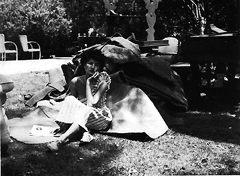
Man Ray's wife Juliette on a pile of materia prima,
Hollywood studio back yard, around 1944
from: Objets de mon affection, 1983
July 24
Purification Day
Wind, sun, air make for a purifying day.
- I played 'ill' and stayed in bed until 11:30, open windows to the garden and landscape, leaves, clouds, moving.
- Looked up moedwil, which translates as spitefulness.
- Took interior shots of the moulin (340k), also with the 645 Fujica, Ektachromes.
July 23
Micro Energy: there's more where this came from
Read this New Scientist on Compaq's alternative energy, in Power on Tap. I'm curious what other RSI inducive slavery in the new galleys will improve battery life...
It's been a long devouring way from informing clay tables to entering data.
Information At First Sight
One scenario envisioned the disappearance of the computer: into the woodwork... ubiquitous computing, smart objects... another propagated an all-in-the-box solution, where a computer would compete 500-channel television. Is the competition still on? Did a 'third way' emerge from the sea of possibilities, or SOP, of technology? Palm set the tone for the current generation of PDA's. Apple is commodifying networked mobile computing with dBook and err, 'AirPort'. Cellular phones come with plug-ins and add-ons. We have MIT's pilot direction savvy tape measure... But where did ubiquity really go since PARC TAB days? Most links to UC date a few years back and drop you in the middle of some boring slide presentation. Is there no news on this topic at all? ...Meanwhile, at MIT where they made it their business to make everything boring and academic look sexy and hip, (and everything Capital look Common) with the usual bravura, they aim high again, at Things That Think. But wouldn't that be Things That Act? Thinking's sexier at the MIT. Browse their research thorrowly. What's lacking? They want you.
SimStupidMe
http://www.thesims.com: how could I overlook an obvious URL and dozens of sites a few days ago? Sim Happens. Big. (ps: upon checking these links for several days in July, they do not seem very reliable... I keep them up for future reference, I'm sure Sims will return from out there soon enough).
July 22
Dorit Cypis moved from god knows where (Minneapolis again after all these years? Where we met when I first visited the US, in the early 80s) to LA and wrote on the card: "I'll come see yours if you'll come see mine..." I'd love to, we haven't seen each other for many years, and I've never been to LA, sure as she hasn't been to St.Germain-des-Bois. But she visited Bhutan this year:
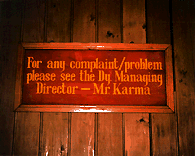
Mr. Karma
July 21
Leave Mail On Server
Picked up the 1,038 messages that were left on the pop.xs4all.nl server since last April 1, since I handled my mail in Netscape on a PC over the past months. Now with all my Internet productivity re:united on the iMac and my server switch to France Telecom, I harvested. Compared to collecting 1,038 pieces of snail mail from a p.o. box some 400 miles away, it's easily gathered, but it doesn't give you a whole lot of information at first sight. Here—again—material qualities would add to recognition and quick selection, from their coherent and traditional labelling (size and weight, post marks, logo's, type of cover, etc.). Subjects headers are a poor substitute.
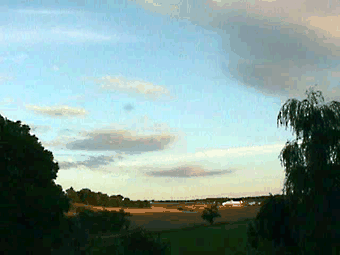
FYI: our piece of the sky tonight at 9
July 20
Think Presence, Think Ubiquity: Message in a Bottle
Yesterday I compared accessibility and retrievability between bits and atoms. The difference is in presence: atoms you can have about, but what about bits? We would gain considerable cognition, if we could move our information out of the beige box (or the Other 5 flavors... though back to any-color-you-like-as-long-as-it-is-one-of-these 2 in aBook), into the real. Even on the desktop... we need other containers, other interfaces to work on that memory.
yBook?
So how do you like to live the Omnipresence of Cute? Look at Apple's iBook. Cute as hell. Back to two colors, but still. A computer? Yeah, like the Smart is a car (and the Swatch a watch). The book, I can tell you already, I don't want to be found dead with. For the time being I can wait for a follow-up of the schleptop, or the PalmPilot, or any of the other PDA's... and it better carry a lot of new functionality. Not another book. Try a bottle. (...and only after the 'message in a bottle' turn, I came across the tangible media group's bottle at MIT, but conceptually I prefer their handSCAPE... I want one). Actually it could be a car. Or some other transporation vehicle. A push bike.
A few years ago I saw a sketch for an answering machine by one of Gillian Crampton Smith's students at the London Royal College of Art Computer Related Design Dept. (with this link follow 'studio', then keep following 'research'—RCA, or how to make things complicated... or real world-like): incoming messages were stored in a small colored ball, a marble. You could put them in your pocket and carry them to your next habitat, or load the machine with'm to listen them back. They allowed color coding. Also I remember this Japanese business card, which can be used as a prepaid phone card, but exclusively for the number that goes with the name on it. That's innovation. The possibilities with connectivity and embedded information and ubiquitous computation are infinite.
Information Tokens
Today's process memory seriously lacks Form. You can't love it, no matter how cute the boxes will be, and Tamagotchis came a long way. The only way out of the box is in extending information technology's workings to the object world. Even card based thin 3D would be a start. So if you have the technology and the design to add 3D rapid token production (3D prototype nano-printing) to a Gameboy/PalmPilot/Tamagotchi/tapemeasure hybrid—if you have a rig that is both uploadable and synchronizable at your desk and at outlets with ATM-like penetration, and can be hooked up to the Internet anyplace, and leaves a trail of smart pellets for others to pick up and load their rigs with, I'll help you fund, finish and ship before Xmas! Honest to Jobs!
July 19
The Poietics of Technology
There's much less imagination invested in technology, than there is fantasies entertained about what it could do. Since technology is considered a tool or medium, its designers can always hope for its shortcomings to be compensated for in intelligent use. Also the computer industry is driven first by interest in what wonders its Bachelor Machines can do in the hands of their users, rather than in what they are. Thus the capability to invest imagination in the products under development is drained into speculation and evaluation of their use. Y/N?: it's an old discussion about whether and how (scientists and) engineers are inventive and creative. Poietics, literally 'making', an unfinishable proces, can equaly be expressed in science, engineering and the arts, but these are different symbolic orders, with totally different affordances and incentives and institutions and productions and lifestreams. Generally though, dreams about the arts are fed by what its objects could be/mean, dreams about technology are fed by what its objects could do.
"Imagine looking at your computer screen
and seeing reality—an image of your city, for instance, complete with moving traffic patterns, or a picture that sketches the state of an entire corporation at this second." It's all about what technology can do: the opening quote from the back cover of the first edition pb of Mirror Worlds sounds a lot like a SimCity 3000 manual to me. The idea of a SimLifestreams set off my imagination though. I hope for Mirror Worlds to next to the Office develop a Lifestreams Studio, with some SimIntelligence added on. So that we could like merge streams and see what are the effects in the forming happyscape delta. For me Early Information Age is not as much about the individual trying to cope with an increasing document stream, but about the management of shared vital interests and the invention of media formats to do so.
Lifestreams Office replaces the desktop and its folders/files/trash ideology with a diary inspired structure, a chronological document stream. Mind you, we are still talking documents. Certificates. Informatic license. It is authoritive, and there's a lot of it out there. And we all have our own. So, information is not objects. The storage and sharing problem (where do I put/how do I move my stuff) is replaced by an access problem (how do I find and to whom do I publish my stuff). Personally, even after long intervals I have no problem to locate a specific book, even magazine (clipping), on a shelf or in a box. I trace it back using my memory and some contextual reasoning (we moved, those people packed, it was probably in that room/pile, then we repurposed these new rooms: so now it should be somewhere... here!). In sharp contrast it is at times hard to search some old file, a sketch, an idea, dusty bits, finding it probably in an old format, and you trashed the software to access it, or it is on another machine. Note that I'm not sloppier with bits than with atoms: the latter just locate better. And allow for serendipity. YMMV.
Information mummified, or nascent
My personal information management (life under information) is structured around its sources:
- objects/spaces (texts, images, and their containers, commodities)
- people (I know, or try to find)
- projects/events (goal and/or play oriented relations/actions between people and objects)
Although most objects, people and projects can be defined in (space and) time, my access to their information is not primarily enhanced by chronology. Essentially I have been managing and schlepping my information since quite some time increasingly by project. Books move from one project to another, on and off their shelves, in and out of boxes, they're not arranged alphabetically or by subject, but by my current affairs with them. So do people, in collaboration and communication and as sources of information. Projects do process the information which is embedded in objects and people, and move them about.
In information culture, beyond location and access, you want process. Process is what animates, thus basically constitutes information. I want (some of) my material to be dead, like objects and books, even more dead: mummified—and some of it very alive and unpredictable and smart, like people. Digital information can be both. It can be stored limitless, not showing any decay, or change over time and act as by itself. Imagine a note that gathered information: instead of finding these two lines you scribbled down on a paper napkin that's falling apart in some old suitcase, now you find this note on your webserver with miraculously attached related texts and images it gathered from the network, all neatly dated and with source reference and links (some of it obsolete of course)... Now that's what I would call... not Lifestreams; but, a happyscape. SimHappiness, and I can't wait for it to be facilitated.
Tout court: technology needs us more than we need it; we need art more than it needs us.
July 18
Lifestrokes
At 18.00hrs we have the kind of winds that ripped of a roof and unrooted several big trees two weeks ago, 15km west. When it's coming into the valley along the river trees start swaying and lots of leaves go into the air. We quickly pick up stuff that flies around the garden and on the loggia and throw it inside. Close windows and fasten shutters. I enter the chickens and the little duck we have since R's birthday. A b/w rabbit he chose last week Tuesday we found dead yesterday morning. With the other little duck. The duck was killed by the chicks. The rabbit we don't know. Maybe food. We're not used to this. To learn is to burn and it made me sad.
The wind is down again. Today was real hot. Like yesterday. Gil sorted two boxes of Lego and other toys Julie's family brought yesterday. Majorette (toy cars et al) has (had?) real nice accoutrements: scaled sidewalks, lamp posts, trees. Miniature worlds are fascinating: I gathered from the debris a small pile of different scale black rubber tires that I carefully nonchalantly positioned on my desktop, like it's a garage's corner. The Art of Rubber Tire appreciation. Like in an old Alan Kaprow installation.
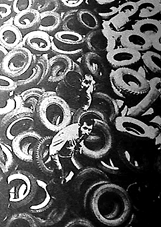
Alan Kaprow's Yard, 1961
from Adhocism,
Charles Jencks/Nathan Silver, 1972
A propos miniature worlds: SimFamily ('build, buy, live' modes) was one of the better treats at Doors 5, Play. Maxis' Will 'games, models, toys' Wright showed us how to manipulate our neighbourhood and family relations in a model of their real environment. Looking into Maxis it's littered (NPI) with information on SymCity 3000, some of it interesting enough, but not half as on the edge as what was presented at Doors. Aha!, the game will be released 'this Christmas' (a familiar story so far) as The Sims. (Forbes May 25) (via Robot Wisdom). And I found some detailed screendumps at NextGenerationOnline.
Think Mirror Worlds ('the Internet's most important mission will be to feed you information about yourself, to store your own files and cyberstuff, not show you other people's websites'): add up embedded (web) servers or BBS communities in a cigarette pack size box, direction-savvy GPS/telematics, real terrain databases and (webcam) monitoring, (online) simulation games like The Sims, remember the Xanadu 'docuverse', and now try to imagine plugging in your own business for the next 20 years or so.
Proposed as 'diary rather than desktop' (Wired 5.02) Lifestreams Office (err, bien étonnées de se trouver ensemble, I'd say in my new language, but what's in a name—a hell of a lot) was released last June 15, as a 'Universal Dashboard for a Connected World' and its electronic information. Now that's metaphor overkill, or plain MOK. So it is not 1991 Mirror Worlds the Book come True, however Gelernter is right about using the Internet to access personal data, building an online Estate as it were (that's where Rolf will find this log one day). But, the office is not where the next Internet revolution is heading, not according to Alamut 2015, not according to Camworld and not according to Moi. We know all that Swatch-has-the-watch ready to .beat any competition, and I'm personally not impatiently anticipating the future alarm system to terrorize my memory with all kinds of updates on my interests. It should feed me very subtly, sneaking in through the backdoor of my consciousness and teasing me away from competing information—that's how I like my information anyway: seductive. Private. When I want it. The way I need it.
1999 I do store personal information on my webserver, but not half as much as I would, when it would be a personal server. I wouldn't mind a mirror worlds inspired collaborative weblogish environment to navigate and publish (some of) my data and communicate with my peers, neither object to coupling GPS-based real worlds to this datascape, and I would certainly want it to have a strong experimental Simish edge to it—to make it Art rather than Office. Let's here it for Lifestreams Studio.
'Since life is a stream of time-ordered events, Lifestreams is a natural storage structure for your connected world' (from the Shockwave demo). Mirror Worlds Technologies do need a better copy writer for the Next Big Metaphor, as it is hailed in some press reactions. Join The Sims, Gelernter! Or mail me at jk@nqpaofu.com.
July 17
Love your log like you love your life. Today is Rolf's birthday: he turns 6. If only I could see 40 years down the line... what kind of society will he be facing when he's my age, anno 2039? Wonder where this log will be... Here?. Maybe here—if I'm really Dead ;-). For sure on some CD MacEncore back-up. On some server. He'll browse it smiling, like I would browse my parents' photo albums or newspaper clippings. But let's not think ahead. Or just two weeks. Until August 2 the four of our ages add up to a 100... alors. Bonne fête à toi Rolf! Je t'aime tant. (And love and congratulations to Jente, who was 38 yesterday, at Alamut).
July 16
I've been going after our official status and some security today. From the polluted French bureaucratic waters, slow mills will flow forms and a paper ID hitlists to my Mairie. I'll step by my favorite mayor again next Tuesday, to see whether they will have washed up. So I weeded, and I trimmed the roses, and I watered the vegetable garden very late, until it was too dark to even see the largest crop (and they are).
Embedded weblogging
Here's a little wonder link from this morning's Alamut: the world's smallest web server. Embedded weblogging coming up: so where would you embed your weblog server? Let me think.
Combining this information with following Forbes ASAP's quote on computing and GPS/telematics, 'Navigating by phone and bird', my shelved ideal world scenario (see also May 29 1998), for healing over-urbannerized physical space, comes back alive. John Crump:
- You step outside your hotel in an unfamiliar city, seeking a restaurant you've been assured is nearby, yet you've been unable to confirm its address. No problem, because you whip out a wireless phone device with GPS capability and point the phone down the street in the most likely direction. The device recognizes your location and heading, and pulls from a remote database a list of restaurants on that street, including your target. (...) Telematics, the linking of wireless phones, satellite positioning technology and mobile computing, is a new element of the evolving world of communications.
"The full potential of wireless technologies is far from being tapped," says Larry Swasey, VP of Telecommunications Research for Allied Business Intelligence. "Adding a caller's location to mobile call data can open a new world of services that could benefit both wireless carriers and consumers." (...) Providing these services involves building both the personal device as well as infrastructure with an economy of scale--neither of which has been realized. (...) Obstacles to large-scale telematics deployment include the lack of standards for the wireless industry as well as a lack of radio channels with higher data speeds and better data and voice carriage on the same voice channel.
Companies are talking about alliances and partnerships to provide end-to-end solutions for people, because they have come to the realization that there's no one company out there that can do it all. And that should bode well for companies like Geovector. With patents on its azimuth indicator, which 'knows' the direction a wireless phone is pointed, and other tools for telematics, the privately-held company is seeking partners for location-based services.
Against Sprawling Urbannerization
Now my personal device would act as a (no goggles—read it like a book, which connects to another of my preferences: flat media, no VR, the critical act of 'reading' information doesn't allow for immersive datascapes) lens to my environment. It feeds me tailor made visual local information at any site on earth, providing an alternative for the sprawling urbannerization we see going on in any first, second, third or other development world region. We'll get rid of two major mistakes: primo our physical environment contains no information tailored to a niche market of me-multiple, secundo it isn't updated in real time. Its ugly design will not improve in a networked GUI device. Probably. We'll see, because in an ideal world it would, at least for me and my kin (I'll design it myself). Welcome to the New Naked World, stripped bare of banners, where at whim I could choose information levels on products, services, or people that would be available in my physical vicinity. Just imagine. Life in a cross between the Yellow Pages and your favorite weblog (sounds like home...). With a now-get-me-off-the-grid-for-the-heck-of-it button.
GPS is the technology which connects information space to the physical environment. It will be at the heart of any real time monitoring and user-centered/customized feedback, 'away from the box'. Coming to think of it we don't need small, smaller, smallest hardware, but good, better, best telematics. To pump home the bacon.
July 15
Way French, road side, river side
On the way back from picking up the 8 Henry II chairs which we bought (since no one else does) a few weeks ago at the Couy vide grenier, we had beach-side pizzas at the Bar de la Plage 'la Sirène', on the Loire in La Charité sur Loire. R+r stayed at home with Isabelle: Gil's sister, and her friend Ritsaert. The Sirène's a time machine, and their anchovy pizza a good bite. We were 15 year old by dusk.
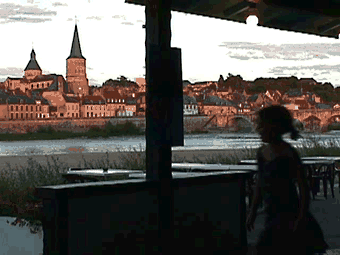
how about this for pretty darned europostmodern: 64 color view on La Charité from La Sirène
Le WebLog C'est Moi™
The consensus web wakes up to weblogs and wonders what they are all about, while the log rolling community is in ambiguous anticipation (as of 7.14.99) of Mbucks to log in and take over—so they're not 'diaries', they're not 'journals', they're not 'links to links to links' and vice versa. What they are and why they weblog can be found in Camworld's rants More about weblogs and Anatomy of a weblog, or at Bradlands. Then at Dmoz Open Directory Project they're listed (50 entries) apart from eg. Art:Journals:Individual (397 entries).
Young URLists Cum Suis
Through the Eatonweb log I hit www.puce.com. Through her links to 'others' and their subsequent others, the past days I wandered off further and further from home into the carefuly and aesthetically self absorbed lifes of ever so many young URLists: first or last name .com. Find out for yourself whether this already is a new and spicier WL generation, or mere journal brooding twenty-somethings, linking one trouble confessionalistic Moi to the Other. Now you shouldn't feel addressed, or should you?
Agency AnyOne-to-One?
The Portal Self shows many faces, as is linked above. For me, weblogging projects niche agency and micro-market cultural production. For agency to work for me I need reliable and provocative sources to feed my interests, and push the publishing envelope, challenge my opinions, eventually propose projects and collaborations, or take mine serious. Increasingly mass media (or professional intermediation, in my case in the arts) don't do the trick for me. I never watch television. I scan my Dutch newspaper's foreign edition once a week and buy occasional local or national French newspapers. I love Nest and Gardens Illustrated and some other hard-to-get-by-in-Burgundy mags. I listen to my neighbours. I daily do my email and some weblogs, or even several times a day, when I know their upload metabolism (I would spend considerably more time online with a 24/24 connection, like in good old ADSL days...). I need the logs that link to professional information, but I wouldn't do one myself, allthough I am thinking to look into the French situation, once I'm getting it. Weblogs are still an unknown genre in Europe.
In an ideal world (where's my funding? I'm out in France and out of a job, didn't I tell you?) NQPAOFU would be personal (like it is today), a bit more tapping from the web, certainly more (but not too obviously) in topical conversational sync with other logs (like it is occasionally with Alamut), and with a readership that feeds it. The latter implies others would contribute to it, possibly from their own sites—at times almost to the point where you get an online conferencing or think tank format: public collaborative working/publishing. Further I could see NQPAOFU spin off several narrower targetted publications, to even smaller (hardly possible) audiences with special interests which I share, again nearing a collaborative work or think tank model. To these micro constituencies the site could also be delivered as if an objet d'art, Ynot. Then I would like to see some chest-to-chest immediacy happening, just to anchor weblogs in a real world in which one can wine and dine and touch wood among peers and make new friends, who experiment living like they do experiment publishing formats. And spread the word.
July 14
Search: "pretty darned Europostmodern", hit: NQPAOFU, and mind the 'but in a nice way'.
Quatorze Juillet
And the Thurignois danced on. I forgot to bring the Mavica and I was too engaged to go get it. Expect some nice pics a year from today.
July 13
- Great images have both a history and a prehistory; they are always a blend of memory and legend, with the result that we never experience an image directly. Indeed, every great image has an unfathomable oneiric depth to which the personal past adds a special color. Consequently it is not until late in life that we really revere an image, when we discover that its roots plunge well beyond the history that is fixed in our memories.
from: Gaston Bachelard, The Poetics of Space
July 12
Today is a year ago that we saw the moulin advertized in this Dutch magazine of French real estate. A first mention of it in nqp#4, July 13-16 and all in nqp#5, August 10 and up. I don't want to read this now, but maybe some of you do. The place in some ways really changed a lot since we arrived, in more significant ways it didn't at all and remains as mysterious and unrevealed and promising as ever. Every once in a while different parts open, close and re:open to us. Where we act, experience wakes up. When we first arrived we promised ourselves not to change anything within the first year, just to maintain it. We moved in, put our belongings where they seemed to (and miraculously did) fit and could serve us. We did not want to take this place by surprise and inform it with our hang-ups. We did not need to express ourselves through it. We wanted rather to be impressed. A year hasn't gone by yet, but slowly by slowly we modify, we adapt. We fill in details with things we brought and with things we collect from its surroundings. A bed here, a lamp there, we removed 8sqm of wallpaper to see what is behind it and whitewashed the wall.
July 11
Asnan vide grenier
Gil bought a great batch of fine old linen: white tablecloths and bed linen, large sizes, heavy quality, hand embroidery and ajour. Littered with initials of those who wined and dined and slept before us. I love to share other people's dreams.
July 10
Last night we had a first night out, visiting the parents of Julie, R+r's friend from school, who we invited to come over and play. When we returned her to their place in Ouagne we stayed for drinks and BBQ and we had a real good time until midnight when we sort of crashed after the boys, but made it home safely 1.5km. down the road.
68 and counting
At the occasion we were introduced to an important notion in French culture: the 68ard (soixante-huitards are 68ers: the generation of May '68). Apparently they have a way. Eg. they give birth at home... hmm, so did we, twice, but Holland has an exceptional midwifery tradition. For contemporary views on midwifery read Midwives among the machines: Recreating midwifery in the late 20th century.
Upon further 'any language' searching for soixante-huitards I via-via hit Marjorie Perloff's site at Stanford University. She's the author of Radical Artifice; Writing Poetry in the Age of Media ("Marjorie Perloff is simply the best reader of experimental writing there is. The extended dialogue she creates between procedural poetics and media-speak, more than making this poetics understandable, might even make it popular." Gregory Ulmer). Her letter to the editors of PMLA (Publications of the Modern Language Association of America), as a contribution on a roundtable on 'Intellectuals', is interesting read for the 'universal ungrounded we'—and the rest of us. Her site is designed by oo-design, who also have ubuweb:visual/concrete/sound poetry as a client. Talk about a lucky train of links... home at art under information.
July 9
Have Nots, Will Fall
Some new figures on information haves and have nots, 'Falling Through the Net', have been released yesterday for the US of Abundancy. I always get confused in matters of 'privilege'. Confusion is a typically privileged, even somewhat euro, mood, I know, but from an American, Bionomics' Michael Rothschild, it is that I picked up my long time favourite quote on this exquisite state of mind: 'If you're not confused, you're not paying attention', and pride myself on my economy.
There's a difference between a fair politics of egalitarianism with reference to democratic information access (the public library model), and a relativism of what you could call the 'conditions of fortune'. In the Age of Missing Information, Bill McKibben turned around the argument of haves and have nots, by stipulating a loss of vital information, and immediacy, which is being replaced by infofodder of sorts. And indeed, lots of have brains (have brains, will connect) are drained to a datascape for no apparent reason other than that it gives them something to be confused about...
As a little aide de mémoire, I supply you with my Have(Not) Alphabetical Candygrammar Koup (or HACK), since songs help me through times with no bandwidth better than bandwidth helps me through times with no content.
A is for Attention, my economy of choice,
bankrupted when
B is for Bandwidth, which brings in the noise...
C is for Computation, which gives you the spleens,
when
D is for you, Dummy, to compete with machines!
E is for Eyeballs, windows to the soul, blinded by bits
as
F is for Feed, which inhibits your wits,
so call in
G for a Grid, or guideline—or hit Q for quits.
H is for Hard disks, spinning to serve you a daily dose
I is for Infinite, zeros and ones, all down the hose
J is for Juggernauts, begging the best of your surf,
K is for the Key, you supply them to your turf,
lest
L is for Lagging, you want none of that,
since
M is for Momentum, where real time is at...
N is the Narrowcast, native to the net—
O is for Offline, where its customization will never be met,
since
P is for Preferences, individually, digitally set.
Q are the Questions, we frequently ask
R is Redundancy: all answers that mask,
ignoring the
Smart Ss, for Sovereignty, Soul, Sex—Sweet and Subtle
which take
T for Trivia, and none for rebuttal...
U is for the Ssavviest User, this boundless center fraction,
whose
V is for Virtual: the quality of his satisfaction
while
wwwWaiting, for intimate, intelligent interaction...
X is for Xerox and Xanadu: as ideal worlds can be planned but never made,
Y is for the Yearning, that otherwise it is never too late,
to, with
Z for Zest, reach an altered state!
July 8

9pm. view of the hills above Cuncy-les-Varzy
The cam that came to the box from a box
For the heck of it and to baffle R+r, I connected my old B/W QuickCam, which was in the box with MacTransit I. Très nouvelle vague. I never got into the cam thing. Now I would like to swing one on a loooong cable around the Nièvre landscape. We'll be getting used to telepresence. I loved BBC's Flamingo Watch, several years ago (1995?), and that was television (those infrared night views!). Remarkable none of that material moved online. Luckily I have a video. And then there's always (always) mount Fuji to return to.
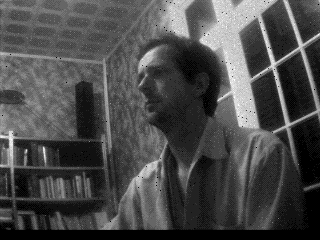
placeholder nostalgia, July 9
July 7-8
Out of a box came my Powerbook 100... and unlike the 230, which has critical power failure, with a gentle kick start I got this old lady spinning (the HD sounds like slipping and the only way to get it to catch is by decidedly drop her on the table several times). Where else to take her as a compensation for this treatment, but out? All summer long Beuvron view nqp.
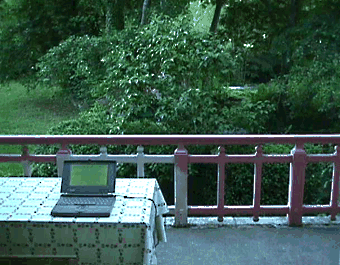
Powerbook 100, 1991, serial number SQ1482M6506: MacDuMerle (was: MacTransit I), 35m portability radius left, but who wants to move...
Just What Is It That Makes Today's Art So Low On Information?
Both in content and context, a lot of contemporary art is high on noise and low on information. Notwithstanding hard copy galore and hesitant electronic publishing (art tries to seize new media), it doesn't deliver a whole lotta change. Since the 80's fine art seems miraculously emptied of information. Ever so tied to institutional representation, even at its most anecdotal, personal, confessional, dernier cri, it hides in the wide cube. If 'change is the essence of information', art doesn't follow any of the current re:routing of cultural production, nor adds value, speed or diversity to it. A 19thC invention, reluctantly autonomous art today lacks the facilities, the balls or program, to generate information. Basically it still debates the Museum, and never left the splendid isolation of history...
The rant I am thinking of the past days doesn't come about easily. And escapes the context of nqp. Myself I escaped into the hills, thought about description and monitoring rather than representation. Tried to leave the symbolic order, slipping in and out as usual. In short, what I wrote is parked for the moment at nqp_left-overs.html (off line ;-) So IOU. On the other hand part of my critique is already embodied in my work, in nqp, in my correspondencies, in the work of friends and peers. To furthermore articulate this critique I need time to conceive of other formats. My current relative isolation is also chosen to facilitate that process. And for a while leave the statements behind. There's plenty of that all over old and new media already after all. Better left alone.
MacDuMerle, aka. MacTransit I, contained an old piece of mine. A ResEdit customization of AfterDark Headlines. Its screensaver suggests random objets d'art, from lists of materials and objects, some I've come across, most mere suggestions for the sculptor that's inside all of us—let it run: alabaster cloud, aluminium hand, porcelain broom, glass string, plaster head, silver gate, plaster frame, cardboard rose, acrylic lily, aluminium cheek, formica cheese, iron foot, wooden gate, lead tulip, lead pitcher, silk table, felt screw, silk duck, paper hat, wooden boot, golden drill...
up
feedback to jk@nqpaofu.com
previous nqp
|
hosted by nqpaofu.com
NQPAOFU
best bits from correspondencies, attendencies and collected hard copy
the mark of launch-and-learn publishing: corrections are generally made within 36 hours. Reduction for print-out is 75%.
SINCE 1998
NQPAOFU PLATINUM
R+r
Rolf and Roemer, kid brothers and our sons Rolf (big R, the elder) and Roemer (little r, the younger). Since we moved to middleofnowhere France they make a great team.
Rolf
(rolf@lemoulindumerle.com) Rolf Indah Jot Kleerebezem (RIJK, Dutch for 'rich' and a common first name) in full, born 17 July 1993: the brooder.
Roemer
(roemer@lemoulindumerle.com) Roemer Indah Pieter Kleerebezem (RIPK, like in Rip Kirby) in full, born 29 December 1995: the trickster.
G., Gil, Gilberthe
(gilberthe-akkermans@lemoulindumerle.com) Gilberthe Akkermans, my partner in life since 1978, mother of R+r and co-proprietor of the Moulin du Merle; leather bag and fashion accessory designer.
Moi
Jouke Kleerebezem, author of NQPAOFU since 22 March 1998; father of R+r and co-proprietor of the Moulin du Merle; artist/curator.
Paul
Paul Perry, long time friend and artist. Canadian with Anglo-Indian roots. Thriving expatriare in the Netherlands since 1982. Current stronghold: Alamut. Current foothold: gardening.
NEW AT THE MOULIN DU MERLE
http://www.lemoulindumerle.com
19990726 text modifications and interior pics (340k)
nqpxiv anchors
materiaprima
pré-avis
purification
energy
1stsight
thesims
server
bottle
book
token
poietics
imagine
notobjects
deadoralive
lifestrokes
simfamily
embedlog
urbannerization
gps
wayfrench
moitm
urlists
portalself
linen
68ard
fall
hack
cam
artunderinformation
|







